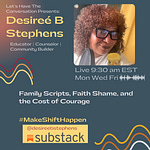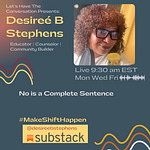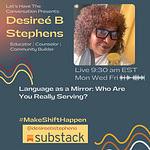A Radical Shift in How We Show Up for Ourselves and Each Other
Supremacy culture teaches us that care is an individual burden rather than a shared responsibility. It conditions us to see asking for help as weakness, to glorify self-sacrifice, and to uphold hierarchies where certain people—often women and marginalized folks—are expected to carry the weight of emotional labor alone.
But what if we choose to break that cycle? What if we build care systems that are sustainable, reciprocal, and rooted in collective well-being?
Reclaiming Care: Moving from Transactional Self-Care to Liberatory, Community-Centered Care
Care has been hijacked by supremacy culture. It has been commodified, individualized, and weaponized to keep us burnt out, isolated, and constantly striving for "deserved" rest rather than inherently knowing we are worthy of it. The self-care industry, while often well-intended, has been shaped by capitalism into something transactional—buy this product, take this solo retreat, follow this rigid routine—and you’ll be "cared for."
But true care—liberatory care—is not a product. It is not an individual task. It is a collective responsibility, a cultural shift, and a radical act of interdependence.
Today's conversation is about reframing care, not as something to be earned, but as something that is inherent and necessary for liberation. We’re dismantling the supremacy-based ideas of who "deserves" care, and we’re reimagining what it looks like to create sustainable, community-centered systems of care that nourish us all.
This article is part of my 100 Days of Community series. If you find value in these reflections, consider becoming a paid subscriber for deeper access to guided reflections, actionable frameworks, and exclusive tools for liberation work.
Free Preview: The Power of Collective Care
"Supremacy culture has conditioned us to believe that care is an individual burden—that it’s something we have to do alone, something we have to earn, or something that we have to keep proving we’re worthy of receiving. And the problem with that is, it disconnects us from each other. It keeps us in this cycle of self-sufficiency that isn’t really sustainable, because at the end of the day, care was never meant to be a solo project. That’s the lie of supremacy culture. The idea that you should just ‘figure it out on your own.’"
"So if we want to shift this, if we want to break this pattern, we have to move from individual self-care—which has a place, don’t get me wrong—to something bigger. Something that actually disrupts the isolation, the burnout, and the hoarding of resources that supremacy culture thrives on. And that means asking some big questions: What does care look like when it’s not transactional? How do we redistribute care work in ways that don’t exploit the same people who are always expected to give more? And how do we build systems that make care sustainable—not just for ourselves, but for our communities?"
Decolonizing Our Relationship to Care
We covered three major shifts in today’s session:
1. Care as a Collective Responsibility
Supremacy culture isolates care, making it an individual burden rather than a shared responsibility.
True liberation means recognizing that care work—whether at home, at work, or in activism—must be distributed, reciprocal, and sustainable.
2. Centering Vulnerability in Care
Supremacy culture teaches us to view vulnerability as weakness.
In reality, vulnerability is what allows deep connection and sustainable support systems. Creating spaces where people feel safe expressing their needs is a radical act of resistance.
3. Designing Care Systems for Sustainability
Without sustainable care systems, burnout becomes inevitable.
By planning for rest, boundaries, and support networks that rotate caregiving roles, we ensure that care does not fall disproportionately on one person.
💡 Reflection Question: How can you shift your approach to care from individual responsibility to collective support? How can you build care systems that ensure no one is left carrying the burden alone?
Keep Reading: Breaking Free from Supremacy Culture’s Grip on Care
We’re diving deeper into how supremacy culture has conditioned us to deprioritize rest, disconnect from our needs, and perpetuate harmful cycles of hyper-independence.
Join us on the other side of the paywall for:
✔️ A step-by-step framework for building sustainable care systems at home and in your community.
✔️ Journal prompts to help you unpack hidden patterns in your relationship to care.
✔️ A powerful reframe on how to move from transactional self-care to liberatory, community-centered care.
👉🏾 Subscribe now to access the full article and the Liberation Parenting Toolkit!
🛒 Get the Liberation Parenting Toolkit: Tools for Building Consent-Driven, Emotionally Liberated Families:
🔗 Click here to grab your copy












